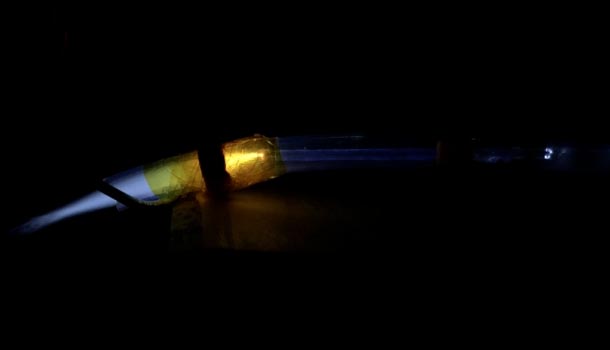
Image of a plasma plume generated from flowing argon in a plastic tube. Room-temperature plasma creates reactive oxygen and nitrogen species during interactions with ambient air. IMAGE: SEAN KNECHT
Reusable medical devices could help solve key COVID-19 problem
Penn State research team designing device that uses plasma to sterilize ventilators, face shields and masks
4/27/2020
By Jamie Oberdick
UNIVERSITY PARK, Pa. — Shortages of medical supplies such as ventilators, face shields and masks has been a recurring problem during the COVID-19 pandemic and production has struggled to keep up. A Penn State team of researchers proposes a novel solution: reusing these devices via equipment designed for plasma-based sterilization in medical facilities.
The research group, the Cross-disciplinary Laboratory for Integrated Plasma Science and Engineering (CLIPSE), uses the fourth state of matter — plasma — for medical applications such as sterilization. Plasma is similar to gases in consistency, but in which the gas atoms and molecules have been ionized. This process occurs when at least one of the bound electrons on an atom has been ejected by some source of energy.
“In our case, we use intense electric fields to accelerate electrons which then collide with those atoms and molecules to produce ionization and also the breaking of the chemical bonds, known as dissociation, creating reactive atomic and molecular species which are effective against bacterial or viral agents,” said Sean Knecht, assistant teaching professor of engineering design in Penn State’s School of Engineering Design, Technology, and Professional Programs (SEDTAPP), who is leading the research.
While plasma is most often thousands to millions of degrees and could destroy medical equipment if used for sterilization, Knecht and his researchers produce plasma that is much cooler — room temperature.
“We use an electromagnetic field to manipulate the parameters to generate room temperature plasma and use the reactivity of plasma discharges to disinfect devices and destroy viruses and bacteria,” said Ali Kazemi, bioengineering doctoral candidate in Knecht’s lab who focuses specifically on biomedical devices.
Along with plasma science and engineering, Knecht also focuses his research efforts on device design. He and Kazemi will combine their expertise to develop devices that generate room-temperature plasma for sterilization. This technology hasn’t been adapted to specifically sterilize re-usable medical equipment.
“We are exploring plasma-generating systems that would be uniquely designed for the sterilization and re-use of different types of medical supplies such as plastic face shields,” Knecht said. “In addition, we are also looking at possible aerosol sterilization necessities, for instance, a device to sterilize the exhaust of a ventilator to help stop the spread of the virus and protect healthcare workers. The technology is very agile and can be deployed for many different purposes.”
The team includes two collaborating sub-groups. Focusing on the design, characterization and testing of plasma-generating systems are Knecht; Kazemi; Berkay Ekinci, graduate student in electrical engineering; Matthew Flanders, graduate student in nuclear engineering; and Sven Bilén, head of SEDTAPP and professor of engineering design, electrical engineering and aerospace engineering. Designing and optimizing sterilization experiments on different materials associated with medical supplies are Girish Kirimanjeswara, associate professor in veterinary and biomedical science, and McKayla Nicol, graduate student in veterinary and biomedical science. Knecht said the interdisciplinary team uniting on this COVID-19 project reflects what is happening elsewhere.
“I think the levels of cooperation that we are seeing in the scientific, engineering and making arenas is just amazing and inspiring,” Knecht said. “Not just here at Penn State and the amazing students that are involved, but truly across the world. I’m proud to be a part of it.”
Kazemi views the project as an opportunity to use his plasma expertise for the greater good at a time of enormous need.
“I received a call from Dr. Knecht a few days after the first United States cases were observed about the significant shortage of supplies in hospitals across the country and the need for a device that can rapidly disinfect used medical equipment,” Kazemi said. “To be given a chance to be of some small help in this global disaster has been very rewarding.”
While a plasma sterilization device would be greatly impactful now, Knecht envisions such a device as standard medical equipment in the future.
“Validation of this technology for viral pathogens will be impactful for society in the future,” Knecht said. “If it works on this virus, it is very likely to work on most or all other viruses, as we find it also works on different bacteria.”
To learn more about Penn State’s effort to innovate potential solutions to address the needs of the health care industry due to COVID-19, please visit masc.psu.edu.



